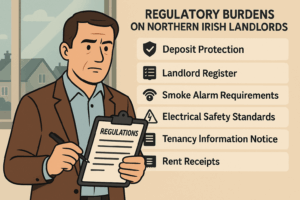 With the coming into force of The Electrical Safety Standards for Private Tenancies Regulations (Northern Ireland) 2024, Landlords in Northern Ireland have yet another regulatory burden to satisfy. This new legislation further adds to the costs of operating a Rental Property Business. Whilst electricians, fire-safety experts, and other service providers won’t find the new revenue streams, it can be hard for individuals and small companies to keep up (while also being the most price-sensitive).
With the coming into force of The Electrical Safety Standards for Private Tenancies Regulations (Northern Ireland) 2024, Landlords in Northern Ireland have yet another regulatory burden to satisfy. This new legislation further adds to the costs of operating a Rental Property Business. Whilst electricians, fire-safety experts, and other service providers won’t find the new revenue streams, it can be hard for individuals and small companies to keep up (while also being the most price-sensitive).
Here is a overview of the key regulatory obligations currently placed on private landlords in Northern Ireland as of May 2025:
1. Tenancy Deposit Protection
- Requirement: Landlords must protect any tenancy deposit received on or after 1 April 2013 in a government-approved scheme within 28 days of receipt.
- Prescribed Information: Within 35 days, landlords must provide tenants with written confirmation detailing the following:
- The amount of the deposit.
- The address of the rented property.
- Contact details of the landlord and any agent.
- Details of the scheme protecting the deposit and dispute resolution procedures.
- Circumstances under which the deposit may be withheld.
- Procedures if the tenant cannot be contacted at the end of the tenancy.
- Penalties: Failure to comply can result in fines up to three times the deposit amount.
2. Landlord Registration Scheme
- Requirement: All landlords letting properties under a private tenancy in Northern Ireland must register with the Landlord Registration Scheme.
- Registration Details: Landlords must provide accurate and up-to-date information about themselves and their properties.
- Fees: The registration fee is £70 online or £80 via paper application, valid for three years.
- Penalties: Non-compliance may lead to enforcement action, including fines.
3. Smoke, Heat, and Carbon Monoxide Alarms
- New Regulations: Effective from 1 September 2024 for new tenancies and 1 December 2024 for existing tenancies, landlords must ensure:
- Installation of mains-powered, tamper-proof (Grade D1) smoke and heat alarms.
- Alarms are interlinked, so activation of one triggers all.
- Carbon monoxide alarms are installed in rooms with a solid fuel-burning appliance.
- Penalties: Non-compliance can result in fines up to £2,500.
4. Electrical Safety Standards
- Regulations: From 1 April 2025, landlords must:
- Ensure electrical installations are inspected and tested by a qualified person before a new tenancy begins.
- Conduct subsequent inspections at least every five years.
- Provide tenants with a copy of the electrical safety report.
- Existing Tenancies: Properties with existing tenancies must comply by 1 December 2025.
- Penalties: Failure to comply is an offence and may lead to enforcement actions.
5. Tenancy Information Notice
- Requirement: Landlords must provide tenants with a free Tenancy Information Notice within 28 days of the tenancy start date, detailing:
- The rent amount.
- The rights and responsibilities of both parties.
- Updates: A Notice of Variation must be issued within 28 days if any information changes.
6. Rent Receipts
- Requirement: For any cash payments related to the tenancy, landlords must provide a written receipt at the time of payment, including:
- Date of payment.
- Amount paid.
- Purpose of payment (e.g., rent).
- Format: Receipts can be paper or digital.
7. Notice to Quit Periods
- Effective from 5 May 2022, landlords must provide tenants with the following notice periods to end a tenancy:
- Less than 1 year: 4 weeks’ notice.
- 1 to 10 years: 8 weeks’ notice.
- More than 10 years: 12 weeks’ notice.
- Tenants must provide:
- Up to 10 years: 4 weeks’ notice.
- More than 10 years: 12 weeks’ notice.
8. Rent Increases
- Effective 1 April 2025, landlords can increase rent only once every 12 months and must provide tenants with at least 3 months’ written notice.
9. Houses in Multiple Occupation (HMO) Licensing
- Requirement: Properties occupied by three or more people forming more than one household must be licensed as an HMO.
- Standards: Licensed HMOs must meet safety and amenity standards, including fire safety measures.
Landlords should ensure compliance with these regulations to avoid penalties and provide safe, legal accommodations for tenants.